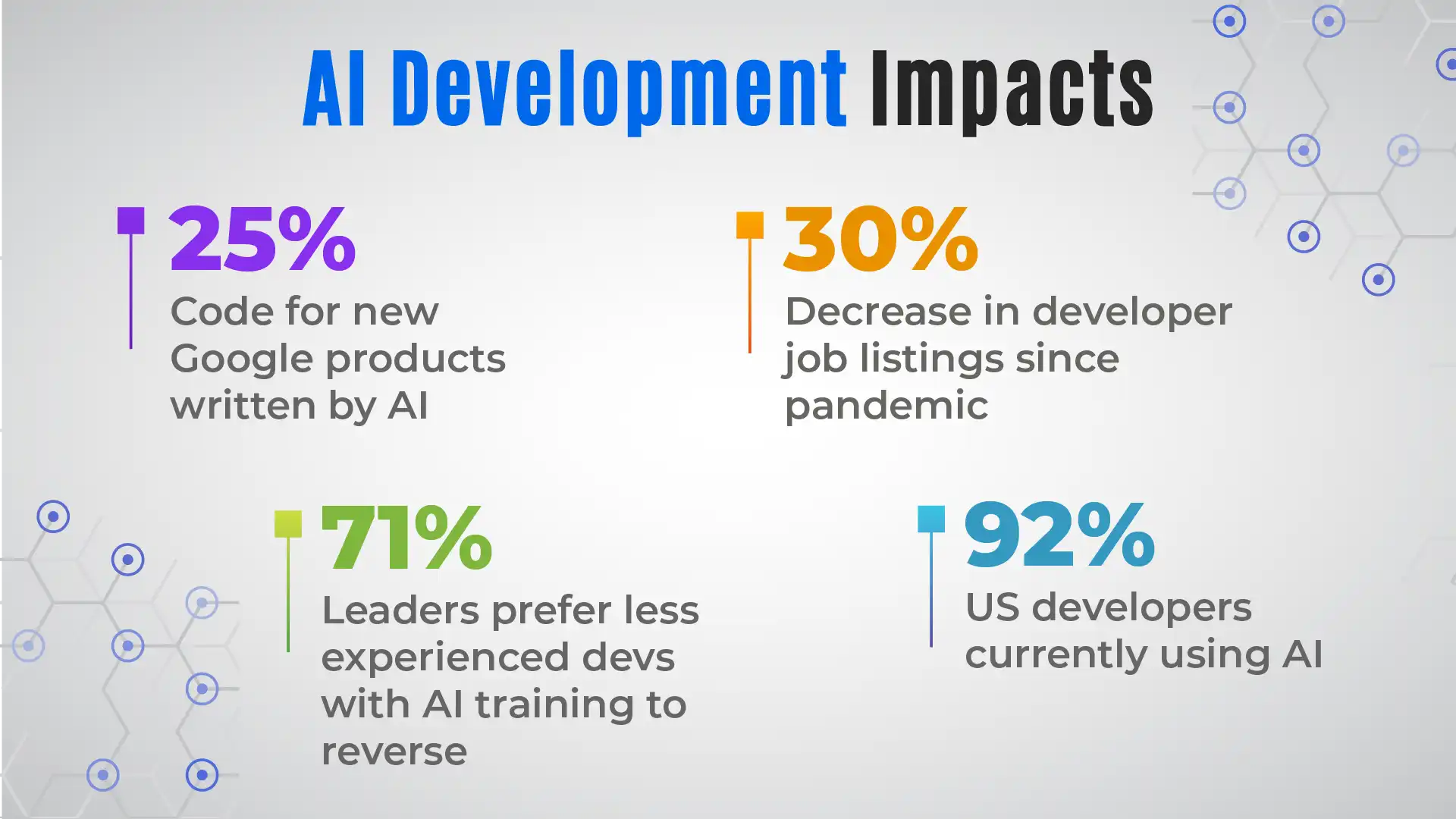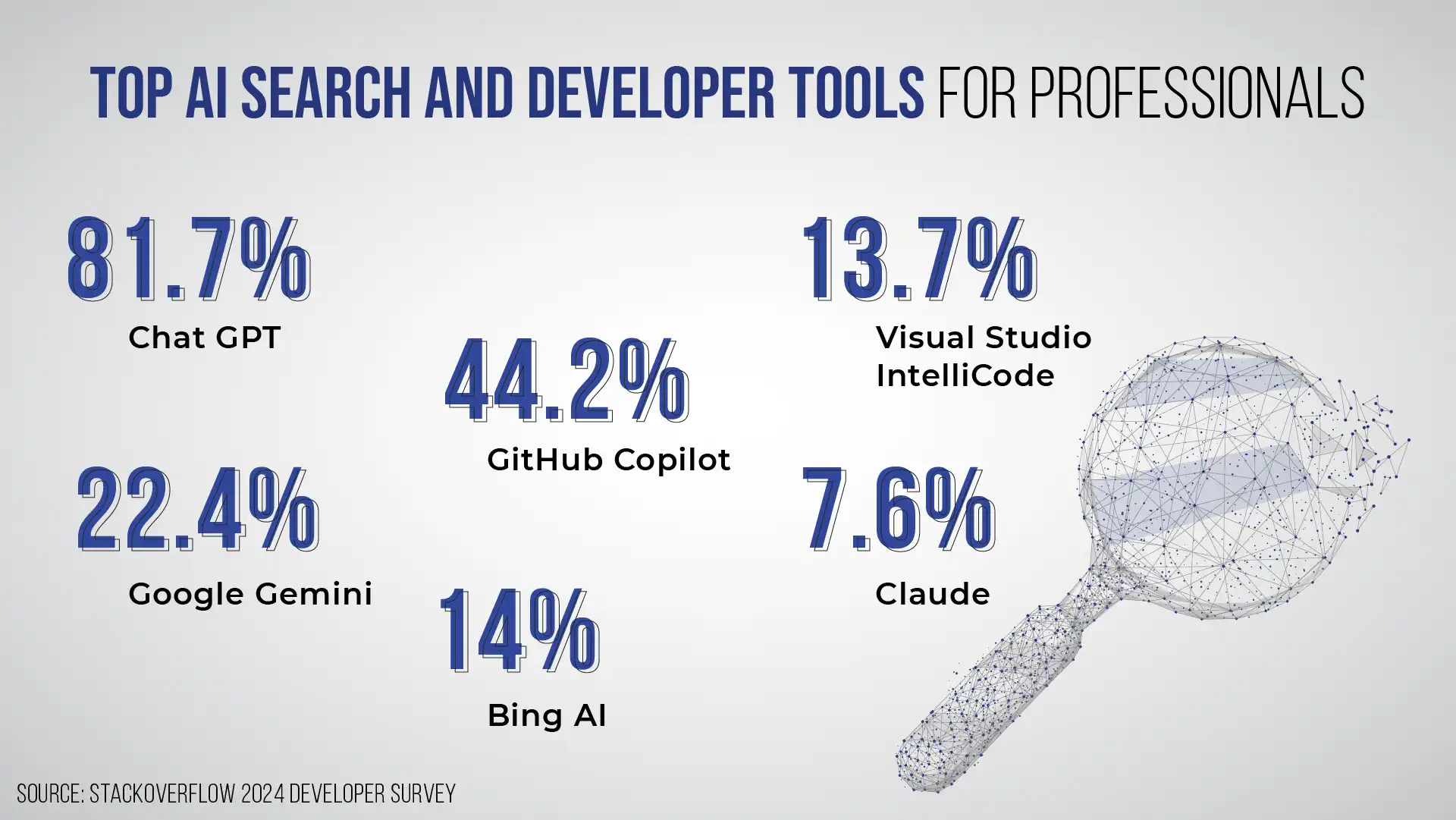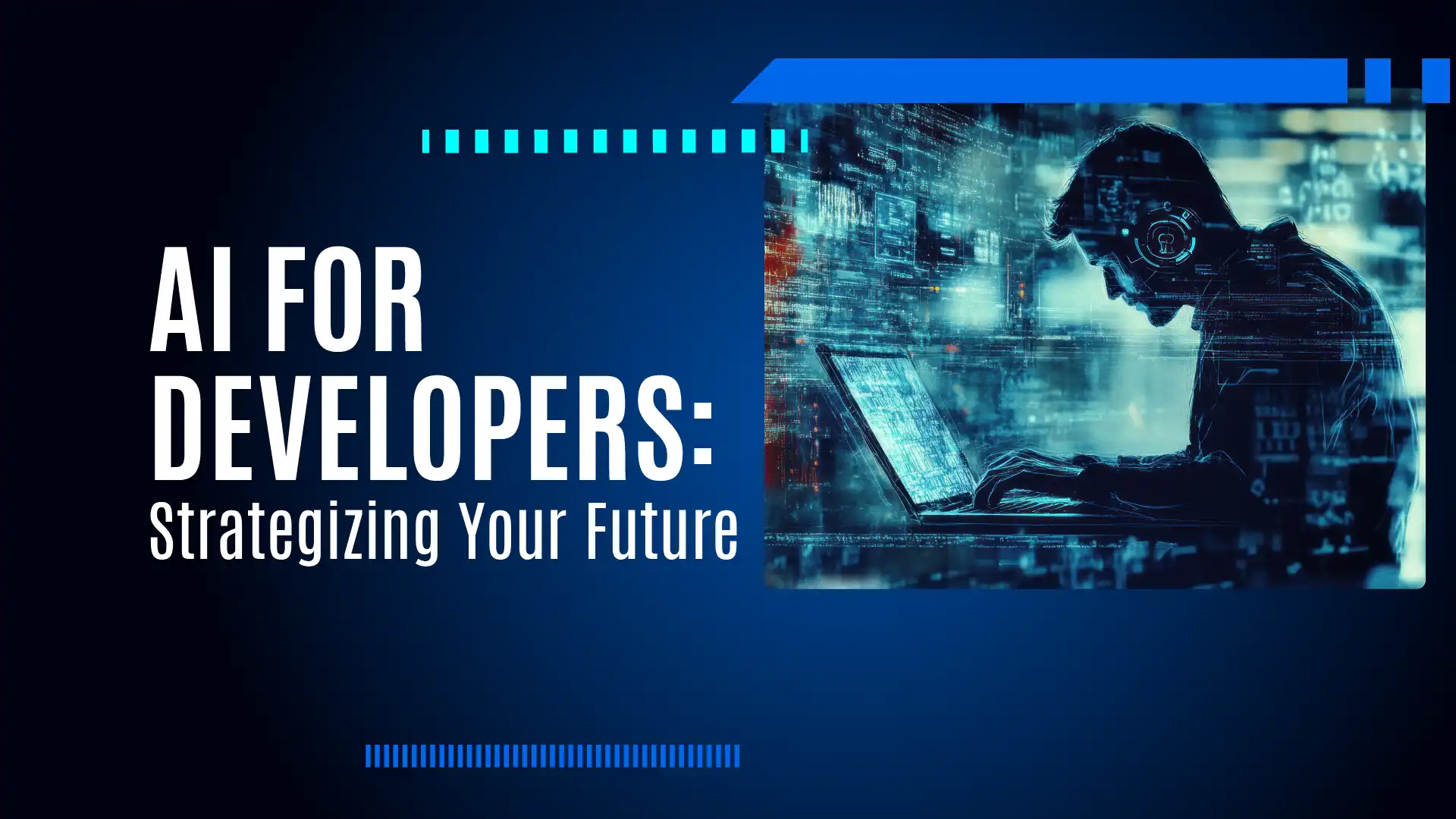In February 2024, Nvidia CEO Jensen Huang made news (and our PTP Report) when he said:
“Everybody in the world is now a programmer. This is the miracle of artificial intelligence.”
He questioned the logic of encouraging kids to study computer science, suggesting that AI coding tools are making it so that “nobody has to program.” Driven by natural language, he suggested, AI will soon be doing the coding for us.
As the year’s gone on, he’s continued in this vein, saying that AI is not just a tool, but can bring entire skillsets to people who lack knowledge in a domain (like coding).
“I think the days of every line of code being written by software engineers, those are completely over… The idea that every one of our software engineers will essentially have companion digital engineers 24/7 — that’s the future.”
Augmented by scores of “digital engineers,” such as via AI agents, he said, would be like scaling up Nvidia’s own workforce a hundred times over.
And as we wind down 2024, the AI trends in software development keep shifting fast and furious, with AI coding solutions expected to generate some $126 billion in revenue by 2025. While none of these have yet shown the capacity to replace human developers (or consistently code without flaws), there’s a growing sense that they’ll soon be doing much of the work by themselves.
What does this mean for software engineers? Is Jensen Huang right, and young people today should pick another skill to pursue?
And what about the current 28 million-odd developers working in the world (around four million in the US)? If AI can really take on half the work, what does that mean for their employment outlook?
In today’s edition of The PTP Report, we consider the AI job impact on developers, both now and into the future, and give our advice for getting on the lasting side of this transformation.
The Impact of AI on Software Engineering Jobs
There’s been abundant speculation on the real-world jobs impact of AI, with the debate going back on forth on the scale, and timing, of layoffs.
What’s clear is that some positions will be rendered obsolete, while new ones are also being made all the time.
What’s also clear is that the more repetitive a task is, the sooner it will be automated. But this isn’t new—development work is about designing and implementing algorithms for machine execution of tasks, which is often the very same goal.
Brookings analyzed 2023 data from the Bureau of Labor Statistics and OpenAI to look at automation percentage by field and found that computer programming was near the top, with as many as 66% of the tasks in the field facing near-term automation from AI.
And when will AI systems reliably take abstract or natural language/pseudocode algorithms and turn them into quality applications? And also test, debug, integrate, and even refactor them, both for security and efficiency?
They’re not there yet.

The big tech companies are piloting AI coding now, with Google claiming 25% of all their code for new products is now written by AI.
Microsoft’s own studies assert that the vast majority of professional developers are using AI (more than nine out of ten), no doubt in an effort to stay on top of it.
And it’s a natural fit: people educated and/or experienced in computing concepts are the most likely to embrace it and learn what it’s all about, making them the point of the spear for practical implementation.
Rather than it be about AI-users or non, for developers the question may be more which roles may become obsolete first?
Junior or low-experience coding positions are clearly the most vulnerable. AI works well from established cases or on highly specific asks, performing research, and giving options, and with new coders requiring their work be carefully checked by senior developers anyway, it’s likely going to be harder than ever to land positions with no experience.
The irony here is obvious: while improvements in AI’s productivity in software development may see it soon surpassing the value provided by junior-level developers, a failure to develop the next generation of coders would mean a dangerous gap in the workforce.
The same can be said about QA and testing roles, where automation is essential and has always been encouraged but has often not been fully practical. With AI-driven tools already capable of automating more testing, learning from prior test cases to generate new ones, and increasing coverage, it’s easy to see less need for human workers in the same numbers.
One of the most common early use cases for AI is generating high-quality test data, which by some estimates consumes as much as 50% of some QA bandwidth.
But currently QA roles remain as necessary as ever, not only for validating new testing tools and their work, but also to help adjust for the higher volumes (and pace) of code being generated. And this rapidly written code may also be buggier than ever (with 40%+ more bugs, by some sources).
In the short term, it may well mean that the more coding is being outsourced to AI, the less QA can be.
Another area AI coding tools have sometimes impressed is in debugging existing, developer-written code. While the process is far from consistent enough to be relied upon, looking to automation to narrow the search for bug fixes is, like generating test data, a massive time saver, and safer than having it develop all new solutions.
The same is true with code review. While an automated review will likely always be worse than the attentive examination of a senior developer with first-hand knowledge of the codebase, the truth is that code reviews are often casualties of time shortage, getting rubber stamped or barely spot-checked in some cases. With a capacity to work in parallel and at scale, AI systems can already look at new code with more consistency.
And while debugging and code review aren’t positions in and of themselves, they are tasks that take significant time and are increasingly capable of being successfully automated.
AI coding tools often fail when asked to write complete applications of any complexity, and even in the smallest stretches the code is a long way from being 100% reliable, so there may never come a time where senior developers and architecture and design roles can be fully replaced.
On Tools
Anyone who’s worked at leveraging AI in their coding has likely:
- Been completely wowed by accurate, functional code (especially in an isolated stretch of functionality, given highly detailed prompting), at stunning speed
- Been amazed by the breadth of languages it can use
- Had that moment where it seems the system is almost frighteningly brilliant
- Then found egregious errors, sections just not completed, and enigmatic jumps in logic
- Had a system go off the rails suddenly (and wildly), making ridiculous assumptions
- Been buried in reams of code where it wasn’t needed
At first glance, using AI for coding can be mindboggling. But as of now, there’s little it can do consistently without close supervision.
It’s been said for many areas of the workforce that it’s far more likely that a human who is skilled at AI will take your job than AI itself, and this is also very true, at least at the current time, in software engineering.
AI-assisted programming is the new normal, and the trick is mastering what it does well, and avoiding sinking unnecessary time and energy into what it doesn’t. (And also, of course, being aware when all this changes.)

Among the top AI tools for developers is ChatGPT, ironically, with models like 4o with canvas and o1 being the most popular at the time of this writing.
Researchers from the University of California Berkeley, MIT, and Cornell created the LiveCodeBench in an effort to evaluate top LLMs on their capacity in coding. Collecting problems from widely used platforms like LeetCode and AtCoder from 2023 and 2024, it seeks to create benchmarks for comparison, much like the LMSYS ChatbotArena does for general chatbot usage.
Check out the current LiveCodeBench leaderboard. (They also have measures for broader challenges like self-repair, execution, and test prediction.)
Mastering AI (Before it Masters You)
Here are some of our suggestions for developing future-proof coding skills as AI tech continues to advance:
Focus on Collaboration: Yeah, okay, no-brainer—this is in every article of this kind. But here we mean looking at AI as your partner. Already it’s useful for giving examples of solutions, developing highly specific code in finite stretches, and researching libraries, frameworks, languages, and more.
Autocomplete can get you going fast, one area causing those AI-enhanced coding efficiency numbers to keep rising.
Rather than wasting time trying to get it to build complex solutions or applications, delegate the routine and specific to AI, and use it for research or to see various ideas.
Automate the Repeated: AI makes this easier, and yes, more essential, than ever. As Dutch firm Xebia writes in their development cards: “Three strikes and you automate.”
The second time you do something, make note of the repetition because if it comes around again (third time’s the charm), you need to spend the time necessary to automate.
AI tools excel at generating repetitive code, making this a good habit to get into.
Give Debugging a Try: Sometimes AI models can find issues quickly, and sometimes they can’t, so it’s not worth time banging your head if the solution’s not there.
But they’re fast, and with ready templates, it may save you precious time in locating a problem that’s making you pull your hair out. Once again, if you consider AI your assistant in this area, it just might save you more than a lot of time.
Your Problem-Solving Ability’s More Important Than Ever: Another thing that’s always in these types of articles is “bone up your soft skills,” which, again, is true, but it’s not always that easy to do.
In software development, this means truly understanding algorithms, efficiency, data structures, and design may matter more than ever before. (And ironically, these are things often learned in development training, despite what big tech CEOs may be saying.)
AI systems can take existing code and replicate it, riff on it, and create code for concise functionality. But it’s going to be some time before they excel at combining conceptual understanding with rubber-meets-road practicality.
Human flexibility, wisdom, cross-domain knowledge, intuition—whatever you want to call these as a set—remain highly valuable.
Combine this with your ability to work with AI coding hands-on and your value isn’t going to be diminished anytime soon.
Development for AI and Machine Learning: One question being frequently asked is if we should use AI to test AI-written code. Regardless, we’re nowhere near asking AI to build and manage AI systems themselves.
The demand for these roles is strong and getting stronger, so if you’re interested in a change or early in your career, it may be worth upskilling in AI and machine learning at a substantial level.
In the same vein, being able to integrate AI models into existing applications is highly valuable. Companies will continue to need developers who understand both traditional coding and AI topics like neural networks, machine learning algorithms, and natural language processing.
Adaptability and learning have always been critical in this field, but the curve’s even getting steeper with AI.
[And if you’re an AI/ML developer looking for a great partner, or a company seeking for AI/ML developers for your team, consider PTP to accelerate your growth!]
Conclusion
With the surge in tools, the coming of AI agents with greater autonomy, and the rhetoric from some big tech companies, it’s only natural for software developers and data scientists to begin wondering if they’ll have a professional future for much longer.
Today these solutions are still fairly erratic, capable of generating impressive code in one moment and also failing after seven consecutive tries. But given the improvement we’ve seen in just one year, it’s very realistic to believe that AI solutions will soon be coding more consistently on par with novice developers. And already they can draw from a much broader spectrum of inputs.
If you’re a developer now with some experience, the trick to longevity may be akin to moving into management: practice handing over the repetitive; master the big picture; and focus on communication, concepts, integration, and verification.
And of course, learn about AI and machine learning.
AI skills for developers are not optional—the future of coding with AI may soon be like running your own team of junior developers who lack real-world experience. Experts are still needed to coordinate, troubleshoot, integrate, and instruct.
With AI likely to replace novice coders first, the real trick may be, in ten years’ time, ensuring there are enough developers still in the pipeline gaining the experience necessary to become the senior engineers we’ll continue to desperately need.
References
Nvidia CEO Jensen Huang: ‘Everybody is counting on us’, Yahoo! Finance
Generative AI, the American worker, and the future of work, Brookings
How to use ChatGPT to write code: What it does well and what it doesn’t, ZDNet
LiveCodeBench: Holistic and Contamination Free Evaluation of Large Language Models for Code, arXiv:2403.07974





